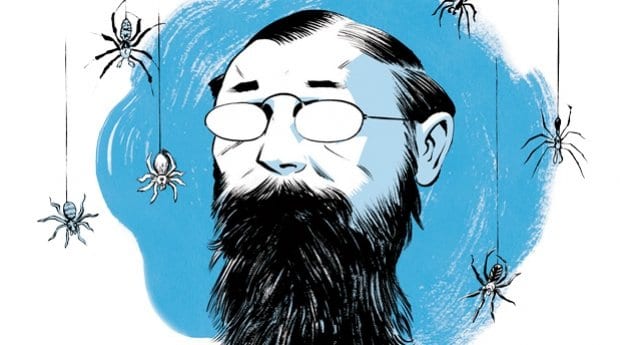I don’t know when my soft spot for spiders developed. While I’m not the kind of person who would ever keep an arachnid as a pet, I have been known, on occasion, to grab a jar and a piece of paper, scoop up a wayward spider and set it free outside. Spiders are, after all, one of nature’s pest controls.
In a world of humans who deny their own nature, turn-of-the-19th-century scientist Ferdinand Karsch-Haack pushed back. Karsch-Haack was not only an incredible force in the intellectual movement of sexual emancipation, but was a renowned arachnologist and entomologist who studied spiders and bugs.
Karsch-Haack was born in Münster, Germany, on Sept 2, 1853. The son of a physician, he went on to study zoology in Berlin, where he published his thesis on the gall wasp in 1877. From 1878 to 1921 he worked as a curator at the Humboldt Museum of natural history.
His work as an arachnologist included creating a catalogue, documenting the spiders of a region of eastern Germany, and publishing articles on species that the museum would receive from all over the world.
While he spent more than four decades with the museum, Karsch-Haack is better remembered for his widely published work as an ethnologist, with a number of works on homosexuality and same-sex love, both in the animal kingdom and among “primitive” peoples. Unlike other authors who published works about homosexuality under pseudonyms, he not only kept his own name, but, from 1905 onward, added his mother’s maiden name, Haack, on all publications.
At the end of the 19th century, there was widespread social panic about decadence. Austrian social critic Max Nordau wrote of “degeneration,” an erosion of traditional values he saw within and influencing art. Another popular idea was that homosexuality was the product of überkultur, or excessive civilization. Published in German sexologist Magnus Hirschfeld’s Yearbook for Sexual Intermediaries in 1900, Karsch-Haack’s “Pederasty and Tribady Among Animals Based on Literature” debunked the assumption that there was no homosexuality in the natural world, refuting the idea that being gay is a social disease.
A similar project was Karsch-Haack’s Investigations of Same-Sex Love, which he planned as a five-part series investigating same-sex occurrences among primitive populations in what we now understand to be East and South Asia, North Africa, the Middle East and mid-European peoples. He published two volumes, The East Asians: Chinese, Japanese, and Koreans in 1906, and The Sexual Life of Primitive Peoples in 1911, but because of the death of his publisher he adapted his next work, on homoeroticism in Arabic societies, for Hirschfeld’s publication instead.
As a natural scientist — unlike his contemporaries — Karsch-Haack rejected ideas of pathologizing same-sex love. He rejected medical terms like “homosexuality” and ideas of the “third sex,” preferring terms like homoërotische or gleichgeschlechtliche liebe (homoeroticism and same-sex love). Part of his work specifically targeted Paragraph 175 of the German penal code, which criminalized homosexuality.
While he lived quite openly in Berlin, he published his last essay, about the gay affairs of Prince Henry of Prussia, in 1933, the same year Hitler seized power in Germany. Karsch-Haack’s writing was likely among the books burned when Hirschfeld’s Institute of Sexual Research was purged by the Nazis. He died three years later at 83.
In a world that shuns the strange and misunderstood, Karsch-Haack knew that nature is nothing to fear. Unfortunately, his respect for the true nature within each of us was ahead of its time, and many sought to work against his knowledge. Karsch-Haack taught me one thing, though: that the sacredness of life starts with the lowly spider.


 Why you can trust Xtra
Why you can trust Xtra


